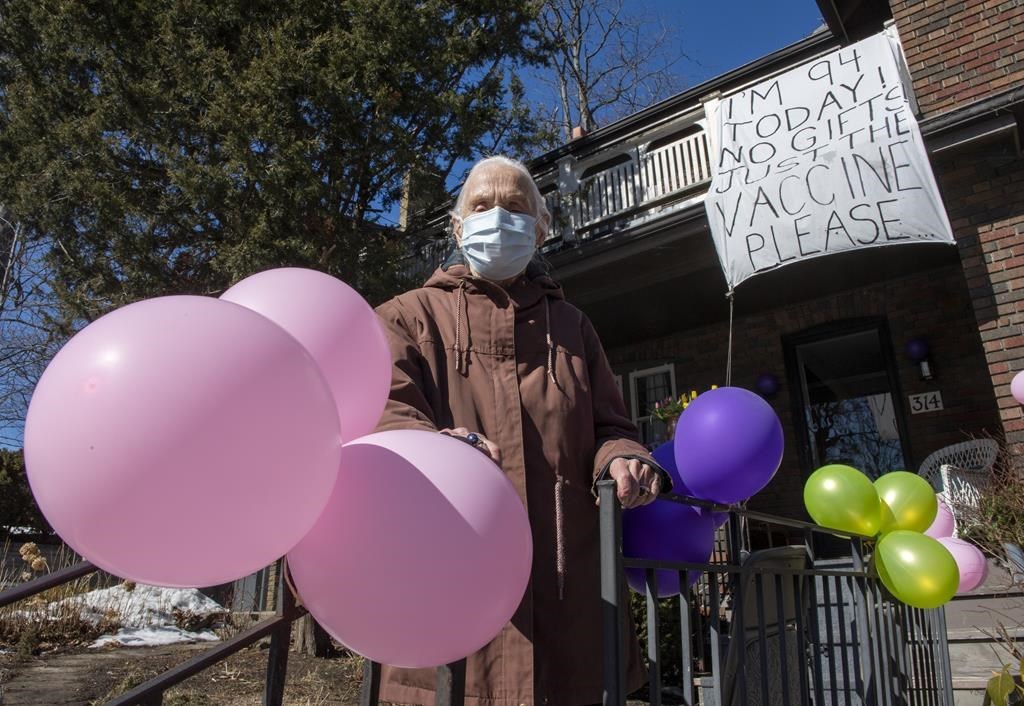Health
COVID-19: Doctors, caregivers push for in-home vaccinations for housebound seniors – BradfordToday


TORONTO — At age 86, diagnosed with Parkinson’s disease and prone to falls, John Bedborough would seem to be at the front of the line amid high-risk Canadians prioritized for a COVID-19 vaccine.
But it’s those frailties that make it unlikely he’ll be able to visit a mass vaccination site, doctor’s office, pharmacy, or any other locale expected to administer doses when Ontario begins its community rollout mid-March, says his daughter, Diane Tamblyn.
The Peterborough, Ont. woman is among a chorus of seniors and caregivers who are pushing for in-home inoculations lest thousands of vulnerable Canadians be left behind.
Some geriatricians are also dismissing the suggestion that unique storage and handling requirements prevent home-based deployment of the Moderna and Pfizer-BioNTech vaccines, both often described as delicate and tricky to transport.
Tamblyn says she’s heard nothing about how thousands of housebound seniors like her dad will be protected, noting they are still exposed to possible infection through visiting caregivers and relatives, and highly susceptible to complications.
“If we don’t go to people that are very frail and elderly, how the heck do we expect them to get to these vaccination centres?” says Tamblyn.
“We send the vaccinations into the nursing homes and retirement homes. What would make somebody 85, living on their own that’s housebound (different)? Why wouldn’t we take it to them?”
Specific details about where and how Ontario will administer shots were absent when retired Gen. Rick Hillier outlined the rollout earlier this week, but he insisted the evolving plan would include a variety of venues and that seniors would mostly likely be vaccinated in their own neighbourhood.
Quebec Health Minister Christian Dube seemed to dismiss the prospect of in-home vaccinations outright when he detailed that province’s plans earlier this week, citing precise cold-storage and handling requirements.
But that doesn’t mean at-home inoculations can’t occur, counters Ottawa physician Dr. Alykhan Abdulla, who says thawed vaccines can survive six hours – plenty of time for a paper-route style delivery to housebound seniors in the same neighbourhood.
Abdulla says he’s already reached out to colleagues who are also confident door-to-door inoculation is possible.
“We don’t know when but I can tell you frankly, that it will happen,” says Abdulla, who’s identified about 36 of his own patients he plans to visit personally.
“I have a list of doctors in the province of Ontario, over 4,000 doctors that are willing to do this work, that are willing to drive to people’s homes. They’re willing to look after people wherever they are.”
Toronto geriatrician Nathan Stall of the Sinai Health System acknowledges provincial complaints that federal delivery schedules and restrictive vaccine handling protocols have hampered rollout plans.
Pfizer for instance, packages 195 vials — or 975 doses — in large trays, and requires them all to be transported together after they’re removed from -70 C freezers.
But Stall says Israel managed to vaccinate seniors in their homes by separating some shipments into smaller packages of 50 vials, and he doesn’t see why Canada can’t attempt to do the same.
“What they did almost immediately was to package vaccine into pizza-sized boxes, so that they took smaller amounts and they went and vaccinated people who are frail older adults living in their homes,” says Stall, who sits on Ontario’s science advisory table.
“The excuse about the federal supply or our handling does not hold.”
Montreal geriatrician Quoc Dinh Nguyen is open to the idea but raises several logistical hurdles, including the possibility of wasted doses if the delivery route, schedule or patient availability is derailed.
“Six hours is not a lot, and we do have to understand that it’s big packs of vaccines that we can’t just … take 10 (doses) and keep the 900 that are left for a month,” says Nguyen.
In the short term, he says it makes sense to focus on vaccinating the most people possible as quickly as possible, while working on a plan to reach at least 90 per cent of those aged 85 and older – the priority group Quebec invited this week.
“If this is the start of the vaccination period, I think it’s OK that you use mass vaccinations, that you take the low-hanging fruit that works,” he says.
Making sure no one falls through the cracks is a big concern to Dr. Samir Sinha, director of geriatrics at Toronto’s Sinai Health System and the University Health Network, who envisions a mix of family doctors, homecare nurses and paramedics administering doses to some patients at home.
“The problem with all of this is that these are the people we know about,” adds Sinha.
“I would say there’s an equal number of people out there who we probably don’t know about because they don’t actually have a primary care provider, or the families are actually providing all the care on their own, or they’re actually buying their care privately.”
Ontario’s vaccination playbook, which outlines public health guidance, includes a vague mention of on-site and mobile clinics to reach “populations that are too frail to attend a mass immunization clinic” such as long-term care residents, but doesn’t mention those who are homebound in the community.
Still, it’s very likely seniors who receive provincial homecare services would be in line for an in-home shot, suggests Sharon Goodwin of the Victorian Order of Nurses.
Goodwin, senior vice president of home and community care at the non-profit, says some public health units “are engaging home care in the process,” and notes homecare workers are also among those who will be vaccinated in the priority group.
Abdulla points to a variety of creative experiments underway in pockets around Ontario including a drive-through model in Collingwood, Ont., and a pilot program in Toronto that is administering vaccines to about 500 seniors and health care workers in three congregate-care buildings.
As for 94-year-old Toronto resident Nina Rockett, all she wanted for her birthday this week was a vaccine.
“I miss being close to people, you know, hugging people, spending time with them,” she says.
Her daughter Margot Rockett is especially eager for clear information about whether seniors facing barriers to leaving the home but willing to try – despite, for instance, hearing problems, vision loss, incontinence, dementia, or difficulty standing for long periods – will be accommodated.
She herself is uncertain whether to risk taking her mother to a clinic because of mobility problems.
“Let’s just get out there and figure this out, and find all these people and connect with them.”
This report by The Canadian Press was first published Feb. 26, 2021.
Cassandra Szklarski, The Canadian Press
Health
New technology to advance women’s cancer care at Southlake

|
|
NEWS RELEASE
SOUTHLAKE REGIONAL HEALTH CENTRE
**************************
This Cancer Awareness Month, Southlake is adding advanced technologies to detect and treat breast cancer and other women’s cancers thanks to generous community donor support, most recently through the HERE is Where Cancer Meets its Match campaign. New cancer care technology, including new mammography machines, the MyoSure System and the MOLLI 2® System will make a measurable impact in diagnosing and treating women’s cancers in the communities Southlake serves.
Southlake is installing three new mammography machines to expand its breast cancer screening program to 1,500 more women each year. Two of these machines have new biopsy capabilities that will reduce the number of cancelled exams due to equipment failure, ensuring timely care for women. Women ages 40 to 49 years old will be able to self-refer for publicly funded mammograms through the Ontario Breast Screening Program starting this fall.
“Early detection is critical when treating breast cancer and other women’s cancers,” said Lorrie Reynolds, Director, Regional Cancer Program at Southlake. “We treat more than 1,700 breast cancer patients at Southlake every year. By adding advanced technology, like the new mammography machines, we’re ensuring women have the best experience at Southlake.”
Southlake is also introducing the MyoSure System, an innovative technology that can help detect female reproductive cancers. Damaged tissue in a woman’s uterus such as fibroids and polyps can now be removed in a precise, minimally invasive procedure that leaves the rest of the uterus intact. This will improve the overall patient experience by supporting faster recovery, reducing the risk of infection and giving more women the option to have children. An estimated 200 women per year will benefit from the MyoSure System.
The new mammography machines and the MyoSure System build on Southlake’s recent investment in the MOLLI 2® System, a made-in-Canada wire-free breast localization technology. This technology is considerably less invasive and more accurate when compared to wire-guided localization, resulting in a better patient experience and improved cosmetic outcomes. More than 200 women each year will benefit from this innovative medical device as they are treated for breast cancer at Southlake.
“As a clinician caring for women with cancer in our community, I’m incredibly proud of the work Southlake is doing to advance women’s health and improve patient experiences,” said Sara Temple, MD, Surgical Oncologist and Chief of Surgery at Southlake. “Women who visit Southlake can be confident that they are receiving leading edge care, close to home when they need it most.”
The World Health Organization anticipates a 77 per cent increase in cancer diagnoses by 2050. Southlake serves some of the fastest growing communities in Canada and anticipates that the number of patients requiring cancer care will grow. By investing in new technology, Southlake is ensuring that women in the communities it serves have access to leading edge cancer care. All of these investments were funded with support from community donors who generously gave to Southlake to support investments into women’s health at the hospital.
“The generosity of our donor community and the impact they have made for women receiving cancer diagnosis and treatment at Southlake is something we can all take great pride in,” said Jennifer Ritter, President and CEO of Southlake Foundation. “From our Women’s Health Initiative donors supporting new mammography machines, to the Ladies in Philanthropy for Southlake funding the MOLLI 2 System, to our long-standing partners The Edge Benefits and Pheasant Run Golf Club enabling the introduction of MyoSure System through their joint annual charity golf tournament, we are incredibly lucky to share a vision of access to exceptional care for everyone who depends on Southlake when they need us most. Thank you, to every donor who contributed to these important upgrades to care for women.”
Southlake Foundation’s HERE is Where Cancer Meets its Match campaign supports the Stronach Regional Cancer Centre at Southlake. For more information or to make a donation, visit: southlake.ca/HERE.





Health
Pasteurized milk includes remnants of H5N1 bird flu, U.S. officials say


|
|
The U.S. Food and Drug Administration says that samples of pasteurized milk have tested positive for remnants of the bird flu virus that has infected dairy cows.
The agency stressed that the material is inactivated and that the findings “do not represent actual virus that may be a risk to consumers.” Officials added that they’re continuing to study the issue.
“To date, we have seen nothing that would change our assessment that the commercial milk supply is safe,” the FDA said in a statement on Tuesday.
The announcement comes nearly a month after an avian influenza virus that has sickened millions of wild and commercial birds in recent years was detected in dairy cows in at least eight states. The Agriculture Department (USDA) says 33 herds have been affected to date.
FDA officials didn’t indicate how many samples they tested or where they were obtained. The agency has been evaluating milk during processing and from grocery stores, officials said. Results of additional tests are expected in “the next few days to weeks.”
WATCH | Bird flu spread in U.S. cows:
For the first time ever, avian influenza, or H5N1 bird flu, was detected in roughly a dozen dairy cow herds across the U.S. About That producer Lauren Bird explores why scientists and public health officials are concerned about the cross-species transmission and whether humans are now at higher risk.
The polymerase chain reaction (PCR) lab test the FDA used would have detected viral genetic material even after live virus was killed by pasteurization, or heat treatment, said Lee-Ann Jaykus, an emeritus food microbiologist and virologist at North Carolina State University
“There is no evidence to date that this is infectious virus, and the FDA is following up on that,” Jaykus said.
Officials with the FDA and the USDA had previously said milk from affected cattle did not enter the commercial supply. Milk from sick animals is supposed to be diverted and destroyed. Federal regulations require milk that enters interstate commerce to be pasteurized.
Tests for viable virus underway, agency says
Because the detection of the bird flu virus known as Type A H5N1 in dairy cattle is new and the situation is evolving, no studies on the effects of pasteurization on the virus have been completed, FDA officials said. But past research shows that pasteurization is “very likely” to inactivate heat-sensitive viruses like H5N1, the agency added.
The agency said it has been evaluating milk from affected animals, in the processing system and on the shelves. It said it is completing a large, representative national sample to understand the extent of the findings.
Matt Herrick, a spokesperson for the International Dairy Foods Association, said that time and temperature regulations for pasteurization ensure that the commercial U.S. milk supply is safe. Remnants of the virus “have zero impact on human health,” he wrote in an email.
Scientists confirmed the H5N1 virus in dairy cows in March after weeks of reports that cows in Texas were suffering from a mysterious malady. The cows were lethargic and saw a dramatic reduction in milk production. Although the H5N1 virus is lethal to commercial poultry, most infected cattle seem to recover within two weeks, experts said.
To date, two people in the U.S. have been infected with bird flu. A Texas dairy worker who was in close contact with an infected cow recently developed a mild eye infection and has recovered. In 2022, a prison inmate in a work program caught it while killing infected birds at a Colorado poultry farm. His only symptom was fatigue, and he recovered.





Health
Remnants of bird flu virus found in pasteurized milk, FDA says – Hamilton Spectator


/* OOVVUU Targeting */
const path = ‘/life’;
const siteName = ‘thespec.com’;
let domain = ‘thestar.com’;
if (siteName === ‘thestar.com’)
domain = ‘thestar.com’;
else if (siteName === ‘niagarafallsreview.ca’)
domain = ‘niagara_falls_review’;
else if (siteName === ‘stcatharinesstandard.ca’)
domain = ‘st_catharines_standard’;
else if (siteName === ‘thepeterboroughexaminer.com’)
domain = ‘the_peterborough_examiner’;
else if (siteName === ‘therecord.com’)
domain = ‘the_record’;
else if (siteName === ‘thespec.com’)
domain = ‘the_spec’;
else if (siteName === ‘wellandtribune.ca’)
domain = ‘welland_tribune’;
else if (siteName === ‘bramptonguardian.com’)
domain = ‘brampton_guardian’;
else if (siteName === ‘caledonenterprise.com’)
domain = ‘caledon_enterprise’;
else if (siteName === ‘cambridgetimes.ca’)
domain = ‘cambridge_times’;
else if (siteName === ‘durhamregion.com’)
domain = ‘durham_region’;
else if (siteName === ‘guelphmercury.com’)
domain = ‘guelph_mercury’;
else if (siteName === ‘insidehalton.com’)
domain = ‘inside_halton’;
else if (siteName === ‘insideottawavalley.com’)
domain = ‘inside_ottawa_valley’;
else if (siteName === ‘mississauga.com’)
domain = ‘mississauga’;
else if (siteName === ‘muskokaregion.com’)
domain = ‘muskoka_region’;
else if (siteName === ‘newhamburgindependent.ca’)
domain = ‘new_hamburg_independent’;
else if (siteName === ‘niagarathisweek.com’)
domain = ‘niagara_this_week’;
else if (siteName === ‘northbaynipissing.com’)
domain = ‘north_bay_nipissing’;
else if (siteName === ‘northumberlandnews.com’)
domain = ‘northumberland_news’;
else if (siteName === ‘orangeville.com’)
domain = ‘orangeville’;
else if (siteName === ‘ourwindsor.ca’)
domain = ‘our_windsor’;
else if (siteName === ‘parrysound.com’)
domain = ‘parrysound’;
else if (siteName === ‘simcoe.com’)
domain = ‘simcoe’;
else if (siteName === ‘theifp.ca’)
domain = ‘the_ifp’;
else if (siteName === ‘waterloochronicle.ca’)
domain = ‘waterloo_chronicle’;
else if (siteName === ‘yorkregion.com’)
domain = ‘york_region’;
let sectionTag = ”;
try
if (domain === ‘thestar.com’ && path.indexOf(‘wires/’) = 0)
sectionTag = ‘/business’;
else if (path.indexOf(‘/autos’) >= 0)
sectionTag = ‘/autos’;
else if (path.indexOf(‘/entertainment’) >= 0)
sectionTag = ‘/entertainment’;
else if (path.indexOf(‘/life’) >= 0)
sectionTag = ‘/life’;
else if (path.indexOf(‘/news’) >= 0)
sectionTag = ‘/news’;
else if (path.indexOf(‘/politics’) >= 0)
sectionTag = ‘/politics’;
else if (path.indexOf(‘/sports’) >= 0)
sectionTag = ‘/sports’;
else if (path.indexOf(‘/opinion’) >= 0)
sectionTag = ‘/opinion’;
} catch (ex)
const descriptionUrl = ‘window.location.href’;
const vid = ‘mediainfo.reference_id’;
const cmsId = ‘2665777’;
let url = `https://pubads.g.doubleclick.net/gampad/ads?iu=/58580620/$domain/video/oovvuu$sectionTag&description_url=$descriptionUrl&vid=$vid&cmsid=$cmsId&tfcd=0&npa=0&sz=640×480&ad_rule=0&gdfp_req=1&output=vast&unviewed_position_start=1&env=vp&impl=s&correlator=`;
url = url.split(‘ ‘).join(”);
window.oovvuuReplacementAdServerURL = url;
The U.S. Food and Drug Administration said Tuesday that samples of pasteurized milk had tested positive for remnants of the bird flu virus that has infected dairy cows.
The agency stressed that the material is inactivated and that the findings “do not represent actual virus that may be a risk to consumers.” Officials added that they’re continuing to study the issue.
-



 Health15 hours ago
Health15 hours agoRemnants of bird flu virus found in pasteurized milk, FDA says
-
Art21 hours ago
Mayor's youth advisory council seeks submissions for art gala – SooToday
-



 Health20 hours ago
Health20 hours agoBird flu virus found in grocery milk as officials say supply still safe
-



 Investment20 hours ago
Investment20 hours agoTaxes should not wag the tail of the investment dog, but that’s what Trudeau wants
-
News20 hours ago
Peel police chief met Sri Lankan officer a court says ‘participated’ in torture – Global News
-



 Science24 hours ago
Science24 hours agoiN PHOTOS: Nature lovers celebrate flora, fauna for Earth Day in Kamloops, Okanagan | iNFOnews | Thompson-Okanagan's News Source – iNFOnews
-
Media15 hours ago
Vaughn Palmer: B.C. premier gives social media giants another chance
-
Art21 hours ago
An exhibition with a cause: Montreal's 'Art by the Water' celebrates 15 years – CityNews Montreal




